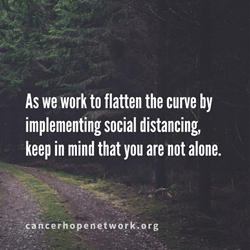
The social work and nursing professionals on our Programs Team offer training and continuous support to our survivor and caregiver volunteers. They offer guidance and care to our clients, supplementing the efforts of our Support Volunteers with referrals and other help.
CHESTER, N.J. (PRWEB)
March 18, 2020
In these changing times, it’s difficult to know how to react or what to think. This new landscape brought on by the novel coronavirus and the uncertainty it carries is not only challenging our health but our daily interactions. Taken together, the world may feel a bit upside-down.
Whether you’re adjusting to working from home for the first time (Hi kids! Hi pets!), missing visits with loved ones now quarantined in nursing homes and rehab facilities, or concerned about treatments already in progress, there are plenty of things to worry about. Our team is here to help.
For nearly 40 years, Cancer Hope Network has been providing one-on-one peer support for cancer patients and the people who love them through a network of Support Volunteer survivors and caregivers. The social work and nursing professionals on our Programs Team offer training and continuous support to our volunteers as well as guidance and care to our clients, supplementing the efforts of our Support Volunteers with referrals and other help.
Fortunately, the social support we offer to patients and the people who love them is – and will continue to be – available by phone, email and chat throughout this health crisis.
We also hope these tips on how to deal with the uncertainty of this “new normal” will help as the changes keep rolling in and the newness of social distancing wears off.
Listen to the experts.
From the CDC to your state and local governments and established organizations with longstanding expertise, find organizations you trust and listen. Over the coming days and weeks, we will share information from experts across the nation and support for those who need it most.
One great place to start is this informative document about social distancing, quarantine and isolation from the Substance Abuse and Mental Health Service Administration
(PDF – https://store.samhsa.gov/system/files/sma14-4894.pdf).
Manage fear.
This Wisdom of the Crowd article that recently appeared in CURE magazine’s Heal edition features words of advice from Support Volunteers across the nation. They were focused on the fear of recurrence, but their advice rings true in the face of uncertainty and fear brought on by the novel coronavirus and spread of COVID-19.
(https://www.curetoday.com/publications/heal/2020/winter-2020/wisdom-of-the-crowd-five-tips-for-battling-fear-of-recurrence)
Give yourself and those around you grace.
The changing landscape means you’ll make mistakes. (See also: Us sending a previously scheduled email about our Golf Classic the morning our governor announced a statewide curfew.) It means those around you will make mistakes. Tempers may get frayed as boredom and worry set in. The time-honored advice of a deep breath and counting to 10 will be particularly helpful in the coming days.
Stay connected.
As we work to flatten the curve by implementing social distancing, keep in mind that you are not alone. The support and guidance provided by the social work and nursing professionals on our Programs team will be there. The comfort and hope provided by our Support Volunteers will still be available.
Call 877.HOPENET (877.467.3638) or visit https://www.cancerhopenetwork.org/ to request a match, chat with a member of our team or to refer a client.
Share article on social media or email:

